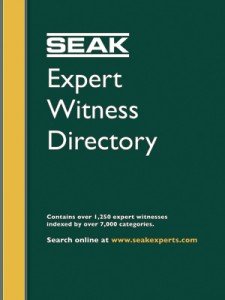Tips Paralegals Can Use to Select Expert Witnesses
By James Mangraviti Jr., Esq., and Steven Babitsky, Esq.
Click here for SEAK’s Expert Witness Directory
Choosing the “right” expert witness can be one of the most crucial decisions made when preparing a case for settlement and/or trial. Experienced and successful paralegals follow a mental checklist in determining who to select as an expert witness.
Specific Area of Expertise Sought
The initial step in the selection process is to determine the specific area in which the expertise will be needed. There are approximately 10,000 categories of expert witnesses including over 750 medical specialties. It is thus imperative that the paralegal have full understanding of both the general type of expertise sought and the specific area in which the expert will be asked to opine in. For example, the general category of expertise may be engineering or safety, the product may be forklifts, and the narrow specific area in which the expert may be asked to opine in may be “forklift fires.”
In a medical malpractice case the general area of expertise may be medicine, the specialty may be OB/GYN, the subspecialty may be maternal-fetal medicine, and the specific area in which the expert will be asked to opine in may be “fetal distress.”
When, and only when the specific area of expertise is narrowed, should the paralegal begin her search for the expert witness. Beyond the true area of expertise, what is counsel really looking for in an expert witness?
What Are the Attributes that Counsel is Looking for in an Expert Witness?
The Expert Witness Must Be Qualified to Testify and Withstand a Daubert Hearing:
Professional memberships and affiliations
Training licensure and certification
Practical experience
Litigation experience
Literature published and research projects
Real world expertise
Education from reputable undergraduate and graduate universities
The Expert Witness Must Possess Integrity and Credibility:
Objectivity
Lack of Bias
The Expert Witness Must Be Reasonably Available:
Not too busy with private practice and consultation to testify
Fees should be reasonable and should not become an issue
The Expert Witness Must Be Willing and Able to Properly Prepare:
Willing to devote time necessary to prepare
The Expert Witness Must Be Articulate:
Communicate truth in an ethical, objective, and effective way
Will not deny or overemphasize uncertainty
An expert who speaks to the jury and observes them for their feedback: nonverbal reactions
An expert who will not back off his/her opinions
The Expert Witness Should Be Likeable and Personable:
Voice
Likeability and believability
Eye contact
Demeanor
Dress
The Expert Witness Must Be Able to Think on Their Feet:
Able to react to difficult questions
The Expert Witness Should Want to Work With Attorneys:
Too busy – doesn’t return phone calls
Condescending
The Expert Witness Needs to Be Able to Roll With the Punches:
Is expert able to deal with difficult and unexpected developments?
Experienced But Not Overexposed or Compromised
Paralegals will have to balance the need to have an expert that knows his way inside a courtroom with the need not to have an overexposed expert who will be perceived as a hired gun. The expert witness should be asked to provide his detailed and complete CV with, when available, and appropriate his latest Rule 26(2)(B) filing. FRCP 26(2)(B) provides in part,
“(B) Except as otherwise stipulated or directed by the court, this disclosure shall, with respect to a witness who is retained or specifically employed to provide expert testimony in the case or; the qualifications of the witness, including a list of all publications authored by the witness within the preceding ten years; the compensation to be paid for the study and testimony; and a listing of any other cases in which the witness has testified as an expert at trial or by deposition within the preceding four years.”
The CV and Rule 26(2)(B) filing should be studied to see if the expert is overexposed, has any lurking conflicts, or is any other way compromised.
Skeletons in the Closet
The expert should be asked directly if she has any skeletons in the closet, has been the subject of any disciplinary actions, or the subject of any lawsuits.
Contrary Opinions or Writings
The expert should be asked if he has ever offered any opinions contrary in this area and/or has ever written or spoken on this issue. All articles and speeches should be researched for potential problems.
Website
The paralegal should check out the expert’s Website to see if any potentially damaging material is listed, which could adversely impact the underlying case.
Conclusion
Selecting the best expert witness for a particular case should only be done after the steps mentioned above are taken.
About the Authors
Steven Babitsky and James J. Mangraviti, Jr. are both former litigators who have trained thousands of expert witnesses. They are the co-leaders of the annual National Expert Witness Seminar, have co-authored numerous texts on expert witnessing including The A-Z Guide to Expert Witnessing, Cross-Examination: The Comprehensive Guide for Experts, National Guide to Expert Witness Fees and Billing Procedures, Depositions: The Comprehensive Guide for Expert Witnesses, Writing and Defending Your Expert Report: The Step-by-Step Guide with Models, How to Become a Dangerous Expert Witness: Advanced Techniques and Strategies, and The Biggest Mistakes Expert Witnesses Make: And How to Avoid Them and have co-produced several educational DVDs for expert witnesses. Steve and Jim currently serve as principals of SEAK, Inc. a national continuing education firm specializing in training, consulting, and services for expert witnesses of all specialties. For more information please visit www.testifyingtraining.com.
Click here for SEAK’s Expert Witness Directory

